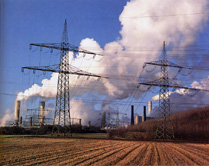
The National Development and Reform Commission (NDRC) Wednesday gave thumbs up to an electricity price adjustment plan.
The average electricity price nationwide will thus be raised by 2.2 fen (0.27 US cents) per kilowatt hour.
Facing a stern power supply situation, the consumers have no choice but to bite the bullet.
But will the price adjustment serve as a recipe to accelerate much needed market-oriented reform in the electricity sector?
The commission justified the price hike plan as a necessary step to address nagging problems concerning electricity supply.
It is true that such a price hike will help reduce the financial burden on electricity grid companies as well as power generating plants.
Many electricity grid companies have had trouble repaying capital with interest due to their misjudgment of the market situation several years ago.
And intensified tension between coal and power companies since last year has also affected the stability of coal supply and incurred more costs for thermal power stations.
These problems demand immediate solutions, but are not enough to justify an electricity price hike.
The price leverage should only be used to pursue a new supply-demand balance in the country's electricity market.
On the demand side, higher electricity price will raise all users' awareness of energy saving. Differential seasonal electricity rates can help a lot in discouraging unchecked growth of energy-consuming industries.
Most parts of the country suffered from chronic blackouts and electricity rationing during the first quarter of this year.
As the power shortage is widely expected to worsen in summer, it is proper to turn to the price tool.
The NDRC expected that a higher electricity price would lure more investment into the power generating sector.
In retrospect, more and more people in this country have realized that the current power shortage should not be blamed merely on soaring energy demand brought about by the country's economic acceleration.
Sluggish reform of the power sector and the government's failure to approve construction of power plants in previous years has also contributed to the shortfall.
If the policy-makers could underestimate power demands in the past, it is also possible for them to exaggerate future demand.
It is said that now about 70 percent of the world's new power plants are being built in China.
In the first four months of this year the country's electricity generation increased by 15.8 percent to 647.3 billion kilowatt hours compared with that for the same period last year.
The breakneck energy growth only revealed how far the energy sector has fallen behind the demand curve. It does not justify the government's move to tighten credit supply because the electricity supply-demand gap will not remain unchanged forever.
The national economy cannot sustain its robust growth without an energy sector that responds swiftly to market signals.
The priority for policy-makers should be to press ahead with market-oriented reform of the energy sector.
(China Daily June 17, 2004)
|

